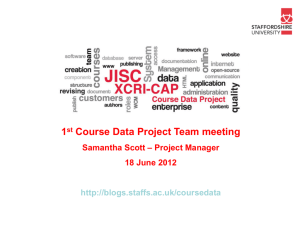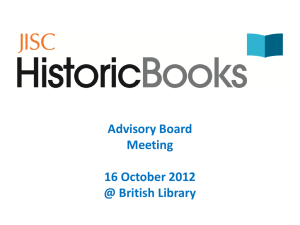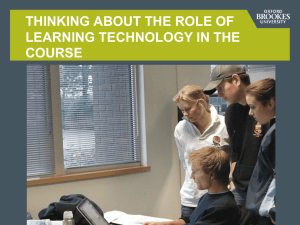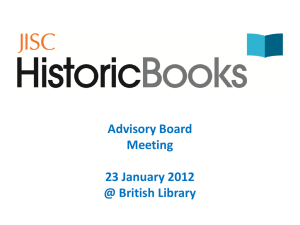Progress Report Template
advertisement
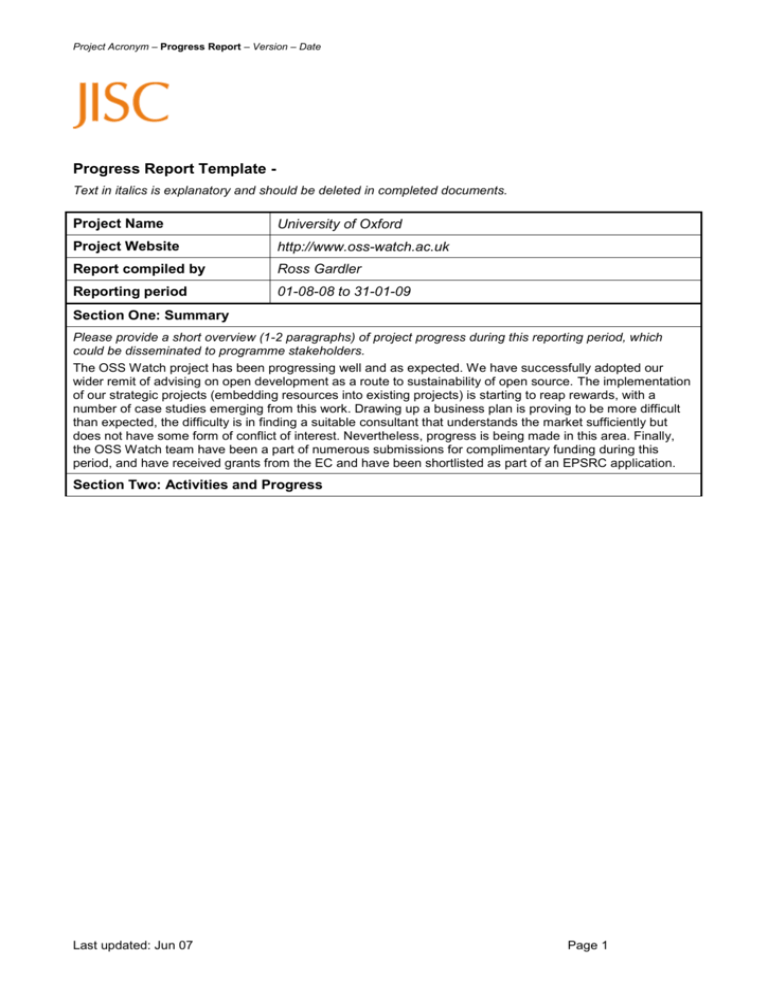
Project Acronym – Progress Report – Version – Date Progress Report Template Text in italics is explanatory and should be deleted in completed documents. Project Name University of Oxford Project Website http://www.oss-watch.ac.uk Report compiled by Ross Gardler Reporting period 01-08-08 to 31-01-09 Section One: Summary Please provide a short overview (1-2 paragraphs) of project progress during this reporting period, which could be disseminated to programme stakeholders. The OSS Watch project has been progressing well and as expected. We have successfully adopted our wider remit of advising on open development as a route to sustainability of open source. The implementation of our strategic projects (embedding resources into existing projects) is starting to reap rewards, with a number of case studies emerging from this work. Drawing up a business plan is proving to be more difficult than expected, the difficulty is in finding a suitable consultant that understands the market sufficiently but does not have some form of conflict of interest. Nevertheless, progress is being made in this area. Finally, the OSS Watch team have been a part of numerous submissions for complimentary funding during this period, and have received grants from the EC and have been shortlisted as part of an EPSRC application. Section Two: Activities and Progress Last updated: Jun 07 Page 1 Project Acronym – Progress Report – Version – Date WP1: Content creation and management - on target. Published four briefing notes and three commissioned pieces. We have also published a significant number of wiki articles and twenty one substantial blog posts. All documents being reviewed at least once every six months and traffic to our sites remains steady. WP2: Liaison and Collaboration - on target. We have 22 days of funded consultation on an EC funded project to embed open development practices in education, we are also working with the Teaching Open Source community to create a mentoring programme for students and teachers. Furthermore, we are working to embed our existing content in a textbook on the production and management of open source software. We have not published a half yearly “report on significant open source events of interest to UK educational software procurement and development” due, in a large part, to a lack of staff able to attend these events. We have maintained and RSS feed of appropriate events. WP3: Studies - No deliverables on this WP are due in this period. WP4: Conferences and Events - ahead of schedule We have run the expected 3 workshops on “open development”, “procurement” and “business and sustainability models”. The first was a BCE event with approx. 45 attendees. The procurement event was an expert workshop designed to inform our strategy in supporting procurement in the sector, this was run in conjunction with RSC SW. We also ran an expert workshop exploring the definition of an Open and Agile Development Process. We provided speakers or stands for a further 17 events including 8 RSC events. This far outperforms our metric, which is to speak at six events per year. WP5: Business and Community Engagement - ahead of schedule Conducted 3 F2F consultations in addition to many more telephone and email enquiries in this period (totalling 9 in the year against a planned 8) we also published our quota of BCE related briefing notes. The deliverable “Active (unfunded) involvement of commercial organisations in the ongoing sustainability of 2% of JISC funded software development within 18 months.” Is proving to be too narrow and too ambitious. We would like to change this objective to “Active (unfunded) involvement of commercial organisations in the ongoing sustainability of two UK academic based software development within 24 months“ This is due to an insufficient understanding in the sector with respect to sustainable open source development and consequently the commercial sector is less than responsive to our approaches. By rephrasing this objective as proposed we would be on schedule having engaged a number of commercial partners with the Apache Wookie (incubating) project. WP6: Project Registry - behind schedule due to difficulties in a) recruiting and b) access to data. The software is in development and has attracted contributions from a third part in Australia. At present the software contains over 500 records, most of which have been collected from the JISC public website. We are discussing with the JISC PIMS project to get access to their data and interviewing again for the developer post in late August. WP7: Project Support – ahead of schedule Strategic project support is progressing well with active support of four projects. We have provided 5 F2F consultations bringing the total to 18 for the year (planned for eight consultations per year). In addition to many more telephone and email, including a number of pre-bid consultancies. WP8: Sustainability – behind schedule We have produced our quota of sustainability briefing notes and have completed a tender for replacing our content management solution with a more manageable system that will also allow us to engage with our community. We have also completed the first phase of the business modelling consultation. However, we have not produced the fully defined business plan due to lack of suitable consultants. WP9: Project Management – internally on schedule, externally behind schedule All staff development and meetings proceeding as expected, however we have not held any advisory committee meetings, we are in the process of reconstituting the committee. Last updated: Jun 07 Page 2 Project Acronym – Progress Report – Version – Date Section Three: Institutional & Project Partner Issues No issues to report. Section Four: Outputs and Deliverables All our outputs and deliverables are available via our website at http://www.oss-watch.ac.uk Section Five: Outcomes and Lessons Learned As predicted in the funding proposal the largest barriers to adoption of open development are: Awareness and understanding Lack of planning for open development activities It will take time for OSS Watch to have a significant impact on these issues but our early results indicate that we are taking the right approach. We are pleased to report the creation of a number of domain specific case studies that clearly demonstrate the benefits of open development in our sector. Section Six: Evaluation We contract an external evaluator in year two of our project. However, we are also working towards better ways of engaging with out communities to provide continual feedback on the services we offer. Section Seven: Dissemination Other than the events attended and organised (see WP 4) and the direct pointers to our information as per WP7 we have also worked with the BECTA funded open source schools project who are reusing some of our materials. We are also engaging with an initiative to reuse our content in a textbook for teaching open source at graduate level. Access to all our outputs is available from: http://www.oss-watch.ac.uk/resources/ News and Publications feed: http://tinyurl.com/nd3v9a Blog Feed: http://osswatch.jiscinvolve.org/feed Section Eight: Risks, Issues and Challenges We are in the process of interviewing for all positions currently filled by temporary staff and have restructured job descriptions to make the software development post attractive to the kinds of people we wish to employ. We have some very strong applications for interview at the end of August. We have also had difficulty finding a suitable business advisor to help build the business plan, our second commercial contractor has failed to deliver on time and we are about to undertake a new search for a suitable contractor. As described above, we are concerned that the target of engaging (unfunded) commercial sector companies with 2% of JISC funded software development projects may be too ambitious. We propose changing this objective to a more realistic “active (unfunded) involvement of commercial organisations in the ongoing sustainability of two UK academic based software development within 24 months”, this will allow us to invest additional resources in education and outreach. Last updated: Jun 07 Page 3 Project Acronym – Progress Report – Version – Date Section Nine: Collaboration and Support It is critical that OSS Watch are able to consult with projects as early as possible in the bid process. Unless we are able to do this it will be very difficult for us to realise some of our other objectives. It was encouraging to have been consulted early in the Rapid Innovation call, however, these projects are too short for us to make a significant impact in the medium term. We were very pleased to be given the opportunity to speak to the JISC Innovation Team and hope to actively explore further ways of embedding our advice with early stage projects. Section Ten: Financial Statement Section Eleven: Next Steps Major new activities in the next period include a rebuild of the OSS Watch site in order to allow more third party engagement. The completion of our business plan and wider engagement with the commercial sector in order to seek additional contributions to the sectors outputs. Total Grant £848,601 Reporting Period Months 7 to 12 Duration of project 24 months Checklist: Before you return this report: Ensure that your project webpage on the JISC site is up to date and contains the correct information. Attach details of any required amendments to this report. Project webpages can be found from: http://www.jisc.ac.uk/whatwedo/projects.aspx If there have been any changes to the original project plan and/or work packages, ensure that amended copies of the relevant sections of your project plan are attached to this report. Last updated: Jun 07 Page 4


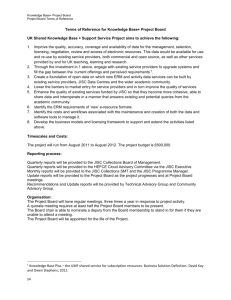



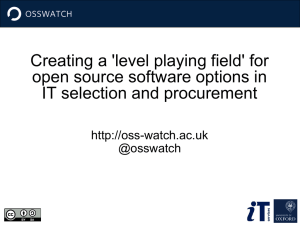
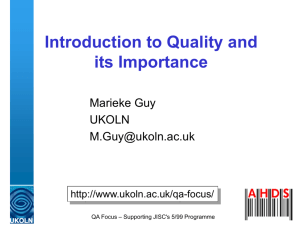
![Selecting_MLEs[1] - Study Net](http://s3.studylib.net/store/data/009211688_1-7ea1360b639a57afdad49a12c2f1e371-300x300.png)
